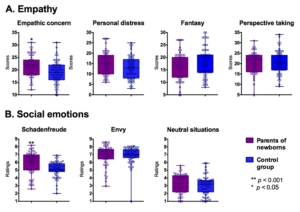The unique social sense of puerperium: Increased empathy and Schadenfreude in parents of newborns
Scientific Reports
Gómez-Carvajal, A., Santamaría-García, H., García, A. M., Valderrama, M., Mejia, J., Santamaría-García, J., Bernal, M., Silva, J., Ibáñez, A. & Baez, S. (2020). The unique social sense of puerperium: Increased empathy and Schadenfreude in parents of newborns. Scientific Reports 10, 5760. Online: https://go.nature.com/2X7M9N8.
En este trabajo demostramos que las personas que devienen madres o padres se vuelven más empáticas y sensibles a emociones morales (con correlatos conductuales y fisiológicos) y los efectos son robustos a las diferencias en nivel educacional, funciones ejecutivas, estado de ánimo, nivel de estrés y horas de sueño
Para acceder al artículo completo hacé click AQUÍ
The unique social sense of puerperium: Increased empathy and Schadenfreude in parents of newborns
Scientific Reports
Gómez-Carvajal, A., Santamaría-García, H., García, A. M., Valderrama, M., Mejia, J., Santamaría-García, J., Bernal, M., Silva, J., Ibáñez, A. & Baez, S. (2020). The unique social sense of puerperium: Increased empathy and Schadenfreude in parents of newborns. Scientific Reports 10, 5760. Online: https://go.nature.com/2X7M9N8.
Pregnancy and puerperium are typified by marked biobehavioral changes. These changes, which are traceable in both mothers and fathers, play an important role in parenthood and may modulate social cognition abilities. However, the latter effects remain notably unexplored in parents of newborns (PNs). To bridge this gap, we assessed empathy and social emotions (envy and Schadenfreude) in 55 PNs and 60 controls (childless healthy participants without a romantic relationship or sexual intercourse in the previous 48 hours). We used facial electromyography to detect physiological signatures of social emotion processing. Results revealed higher levels of affective empathy and Schadenfreude in PNs, the latter pattern being accompanied by increased activity of the corrugator suppercilii region. These effects were not explained by potential confounding variables (educational level, executive functioning, depression, stress levels, hours of sleep). Our novel findings suggest that PNs might show social cognition changes crucial for parental bonding and newborn care.
To access the full paper please click HERE



